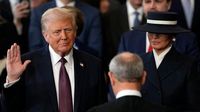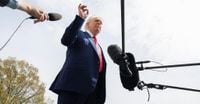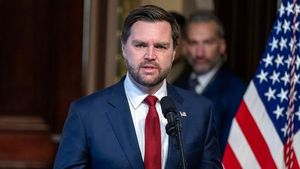In a surprising twist of political discourse, U.S. Attorney General Pam Bondi suggested on Fox News that President Donald Trump might consider a third term, a notion that many legal experts deem unconstitutional. On April 6, 2025, during her appearance on "Fox News Sunday," Bondi stated it would be a "heavy lift" for Trump to pursue this path, reflecting both admiration for his presidency and skepticism about the feasibility of circumvention of the 22nd Amendment.
Bondi's comments come amid ongoing speculation about Trump's future political ambitions, particularly as he has hinted at a desire to remain in power beyond the traditional two-term limit. Trump himself has not dismissed the idea outright, asserting in a recent interview that he is "not joking" about the possibility of a third term, stating, "There are methods which you could do it." This has ignited a heated debate about the implications of such a move and the legal boundaries surrounding presidential terms.
The 22nd Amendment, ratified in 1951, explicitly bars any individual from being elected to the office of the President more than twice. It states: "No person shall be elected to the office of the President more than twice." Trump's interpretation of this amendment has raised eyebrows, particularly his argument that it only applies after two consecutive terms. This view has been met with skepticism from constitutional scholars, who assert that the amendment's language does not support such an interpretation.
During her interview, Bondi expressed her wish that Trump could remain president "for 20 years," yet she acknowledged the constitutional hurdles that would make such a scenario unlikely. "I think he’s going to be finished probably after this term," she added, emphasizing the challenges of amending the Constitution. This sentiment resonates with many in the political sphere who believe that any attempt to alter the term limits would face significant resistance, particularly from Democratic-controlled states.
Trump's discussions about a third term are not new; he has floated the idea since his first term, previously suggesting at a rally in September 2020 that he might be "entitled to another four after that" based on how he was treated in office. His comments have often been playful, yet they reflect a deeper strategy to keep himself at the forefront of political conversations.
In a recent interview with NBC News host Kristen Welker, Trump reiterated his position, saying, "It is far too early to think about it" but also maintained that he is "not joking" about the potential for a third term. He suggested that there are methods to achieve this, although he did not elaborate on what those methods might entail.
Some of Trump's allies have proposed unconventional routes to sidestep the 22nd Amendment. Representative Andy Ogles of Tennessee has introduced a resolution to amend the Constitution, allowing presidents to serve three terms if they have not served two consecutive terms. However, such an amendment would require a two-thirds majority in both chambers of Congress, a feat that seems improbable given the current political landscape.
Critics of Trump's ambitions are alarmed by what they perceive as a threat to democratic norms. Representative Daniel Goldman of New York articulated these concerns, stating, "An attack on democracy is actually in motion and people need to recognize that it is not hypothetical or speculative anymore." This sentiment is echoed by many who fear that Trump's rhetoric and actions could destabilize the constitutional order.
Interestingly, Trump's discussions about a third term have drawn parallels to other world leaders who have successfully circumvented term limits. For instance, Russian President Vladimir Putin and Chinese President Xi Jinping have both found ways to extend their rule, raising concerns about the implications of such behavior in a democratic context.
In the backdrop of these discussions, Trump's administration has faced challenges, including economic turmoil stemming from controversial trade policies. The stock market has reacted negatively to his recent decisions, further complicating the political landscape as the 2026 midterm elections approach.
Despite the gravity of the situation, some Republicans have dismissed Trump's remarks as mere jokes or distractions. House Speaker Mike Johnson noted that he and Trump had "joked about" the idea of a third term, emphasizing the need for a constitutional amendment to make it a reality. However, the seriousness of Trump's intentions cannot be overlooked, especially given his history of pushing boundaries.
Public opinion appears divided on the matter. A recent YouGov survey indicated that while 60 percent of Americans oppose Trump seeking another term, 56 percent believe he will attempt to do so nonetheless. This dichotomy reflects the complex relationship between Trump's supporters and detractors, as many grapple with the implications of his potential return to power.
As the political climate evolves, the conversations surrounding Trump's ambitions will likely intensify. With the 2028 presidential election looming, Trump's strategy of keeping the idea of a third term alive may serve to maintain his influence within the Republican Party and among his base. Whether this tactic will bear fruit remains to be seen, but it underscores the ongoing tension between constitutional norms and the unpredictable nature of contemporary politics.
In conclusion, the prospect of Donald Trump attempting to secure a third term raises significant constitutional questions and reflects the broader challenges facing American democracy. As legal scholars and political analysts continue to dissect the implications of such ambitions, the nation watches closely, aware that the future of its political landscape hangs in the balance.







